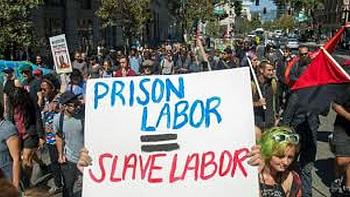Private Corporations Have Turned Public Prisons into Money-Making Ventures
In the past few years, businesses have privatized almost every aspect of the public prison system and the downsides of this trend can no longer be overlooked.
Tim Requarth, a freelance journalist, writing for The Nation, interviews David Angel, a correctional facility kitchen officer who had worked at prisons all over Michigan. In the course of the interview, Angel complains that he got more than he bargained for, working in state prison.
“It was a constant daily struggle,” Angel recalled. “At first, it was the little things: Food was spilled but never cleaned up. Meals were served late, or the kitchen would run out of food and the staff would have to swap ingredients.”
Angel said he saw peanut butter being substituted for a hamburger patty more times than he could count. And many times, the prisoners were fed rotten food, unless he was quick enough to throw it out. He said Aramark was the corporation in charge of providing food to the prisoners and they did a very poor job of it.
“I threw out 700 pounds of rotten potatoes once.” “Nevertheless, the spoiled food made its way into the kitchen or fresh food would become spoiled because of Aramark’s poor storage practices,” Angel said. “That’s when I saw maggots under the big commercial mixer.”
Angel emphasized that the health of prisoners is constantly jeopardized so that corporations can make millions of dollars in profit. Aramark is not alone in this. Many companies cooking for prisoners would serve less nutritious food in lower quantities and also try to take advantage of economies of scale by buying in bulk even when it meant the food would spoil before it got to be eaten by the prisoners.
This same issue has cropped up in several other prisons across the state where private corporations are kept in charge of incarcerated men and women. According to the report, at one facility, 30 people fell ill with foodborne illness after fly larvae were found crawling around the food-service line. At another prison, an Aramark employee was caught serving meatballs fished out of a trash can. The company was fined $200,000 for unsanitary food preparation, substituting nutritionally inferior ingredients, and routinely shorting prisoners on calories.
“This [situation] has created an environment of theft, extortion, and robbery—all in the name of survival,” said Ramone Wilson, a prisoner quoted in the article. “If you’re on an empty stomach, then you’re desperate.”
This problem is not only in the area of privatized kitchen services, but there have also been reports on problems with privatized healthcare and privatized transportation services in prison.
Angel has likened privatization of prison services to slavery and he is of the opinion that there should be no economic benefits attached to it. “Slavery had a lot of economic benefits,” he said “A lot of people owned slaves and produced goods, and a lot of ordinary people benefited from those goods, and so on. But nobody today would say, ‘Well, we should have just reformed slavery, improved slavery, reduced it to an acceptable level.’ There is no acceptable level. And that’s my position on profiting off incarceration: There is no acceptable level. It’s inherently morally and ethically wrong.”
Comments
There are 0 comments on this post













